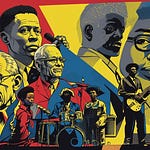Greetings, Reggaeology Fam,
Today, we’re diving into a development that's reshaping the music industry—one with deep implications for both the icons of yesterday and the voices of tomorrow.
Hedge funds and major players have been investing billions in the acquisition of legacy catalogs, but these deals don’t just cover music rights anymore. In the fine print, they’re also locking in rights to an artist’s image, likeness, and voice, meaning the deceased or retired can now "perform" forever, thanks to AI-generated vocals and hologram technology.
This raises important questions about the impact on emerging artists—and the future of creative originality itself.
The Rise of Virtual Legends
Imagine it: Marley, Prince, and Whitney, appearing in hologram form at festivals, “singing” new songs generated by AI systems that have meticulously studied their vocal inflections, word choices, and phrasing.
These virtual versions of our musical heroes bring about an unprecedented new revenue stream for catalog holders and a seemingly endless supply of “new” material for fans.
For diehard audiences, these holograms offer a chance to connect with icons they may have never seen live—a captivating prospect for many. But there’s more at play than nostalgia.
A Challenging Stage for New Talent
With AI reanimating legends, emerging artists face a new competitor—virtual versions of history’s most beloved performers. When an iconic hologram shares the same stage as up-and-coming talent, there’s a risk of shifting attention away from new voices.
The appeal of “seeing” a reanimated legend is powerful, and this may lead venues, labels, and fans to prioritize these holographic concerts over the authenticity of fresh, living artists.
The creative energy new talent brings may be overshadowed, squeezed by the technological immortality of musical legends.
Revenue and Recognition: Fewer Opportunities for Emerging Artists?
Let’s talk dollars and cents. The estates behind these catalogs can license AI-generated music, pull in concert revenue from hologram appearances, and even land lucrative sync deals—securing a lion’s share of the revenue that might otherwise support new artists.
In reggae and beyond, where creative expression is already up against industry hurdles, this financial redirection could impact emerging artists’ ability to secure funding, distribution, and label attention.
Hedge fund-backed catalogs are increasingly safe investments, while new artists become a less certain—and therefore less attractive—prospect for labels and managers.
Ethical Questions and the Value of Authenticity
There’s something irreplaceable about a real performance—the energy, the interaction, the spontaneity.
Hologram and AI performances may dazzle with lifelike precision, but they can never replicate the depth of a genuine, human connection. For emerging reggae artists, whose music is often rooted in cultural and social commentary, this is a significant difference.
Reggae was born from struggle, resilience, and authenticity, and the pressure to “perform” next to virtual icons may strip away the raw essence that gives our music its power.
We’re also venturing into an ethically complex zone. Should the voices of legends who aren’t here to consent be used in new works?
And who decides the direction of these new “projects”—a hedge fund, a label, or an artist's family?
These are pressing questions with no easy answers, especially for genres steeped in the value of creative ownership and respect for one’s roots.
Evolving Fan Expectations: Will Authenticity or Technology Win?
The rise of AI and hologram performances sets a new bar for live shows, one that might be harder for new artists to reach.
How do you compete with a virtual icon who can “perform” night after night without missing a beat?
To meet this challenge, younger reggae and dancehall artists may feel pressured to adopt similar technologies, pulling them further away from their roots in favor of the spectacle that tech now enables.
But here’s the truth—authenticity has always been the beating heart of reggae. There’s a reason we’re drawn to live sound systems, roots gatherings, and intimate shows where the performer’s heart and soul are palpable.
In the end, it may be that a tech-driven resurrection of legends cannot replace the value of authentic performances by fresh, modern voices.
So, What’s the Next Move?
For reggae and emerging artists worldwide, this era calls for resilience and creative adaptation. Independent platforms, grassroots marketing, and direct-to-fan strategies are vital in this evolving landscape.
By building an unbreakable fanbase and leaning into the unique aspects of live, unmediated performance, emerging artists can continue to carve out a place for themselves. Reggae has always thrived in the face of adversity—now it’s time to stand strong once again.
In the words of our beloved Marley, “Get up, stand up, stand up for your rights.” It’s a new battlefield, but the soul of reggae will always be timeless.
Until next time, let’s keep the fight for originality and creativity alive in every beat, every line, and every performance.
Lloyd 'Reggaeology' Laing
Music Business Analyst and Advocate for Fair Pay. Follow @Reggaeology Everywhere














Share this post